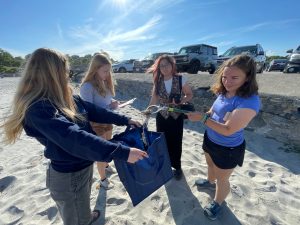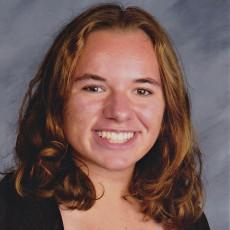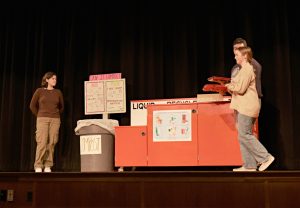
Maggie, right, collects skanky waste, including cigarette butts, from the Second Beach at Middletown, Rhode Island. Maggie is seen with two other high school composters who are serving as Peace Fellows this summer, Emma (center left) and Bella. Sarah Lavallee from Clean Ocean Access is coordinating the team and is seen bagging Maggie’s stuff. Every piece is noted down by Emma.
During the first Green Club meeting of my junior year of high school, Sarah Lavallee from Clean Ocean Access (COA) attended and presented about the Healthy Soils Healthy Seas Rhode Island Initiative (HSHSRI) and other volunteering opportunities. The HSHSRI program caught my eye, as it aims to reduce food waste through composting. After learning about the program and the opportunity to be an intern at COA, I applied right away.
I began to intern at the COA office a few days a week where I learned more about HSHSRI and the steps I would need to take to successfully implement this program at my school. Before this, I had an idea of what composting was, as my family composted for a few years before, but I was a little unsure as to whether or not my entire school would be able to compost properly.
I knew that composting might be a challenge to bring to Portsmouth High School (PHS), especially in the lunchroom where hundreds of rushed teenagers dispose of their waste in a matter of minutes before getting back to class. I thought about it for a while, and at a school with over 800 kids, composting could make a pretty large impact. This motivated me to get started!
With Sarah’s help, I began to carry out the steps I needed to take to successfully begin this project. First, I reached out to members of the Green Club and our advisor Mr. Arsenault. I met with them and asked if they would be on board and willing to help out along the way. After this, I contacted the PHS principal and met with her to discuss this initiative. Following this meeting, I met with the janitors to explain to them the changes that we were making in the lunchroom and made sure they were okay with taking out an extra bag of waste to be picked up by Black Earth Compost, a private compost hauling company.
After meeting with everyone and getting approval, I worked with the Green Club and began brainstorming engaging ways to inform our school on composting. We decided that a presentation and a skit would effectively help our school understand how to compost. So, I secured dates for a school-wide assembly and I split everyone into groups and gave them jobs to do. Some kids worked on writing the skit, while others made props. We also had people working on the presentation and publicizing this project. I even got our school’s theater club involved, as they were the ones to be acting during the performance.
When the day of the assembly came, I was very nervous as to how our school would react. I hoped that our skit would keep kids attentive, while the presentation would bring meaning and purpose as to why we are doing this.
It was a success! Students loved the skit and ended up being curious about the program. Many kids asked questions and were talking about it the entire day.
The first few days of composting in the lunchroom were difficult. Kids were throwing trash in the compost, not knowing that it would contaminate it. We tried our best by standing next to the waste station and helping sort out what goes into “landfill”, “recycle”, or “compost”. Eventually, kids knew where to put most of their waste. However, items like cardboard trays or milk cartons often ended up being misplaced. The most common misconception was that these could be composted, but unfortunately, there was a coating on these that made them unable to compost.
Some solutions we tried were closing the compost bin so kids would have to open it to actually compost (we thought it might stop the kids rushing and accidentally dropping trash in the compost) and making signs that said “No Milk Cartons!” This worked a little bit, but at the end of the school day, I would check the bin and still find trash. So, I resorted to making BIG signs that said “Food Only!” and I made sure words got around quickly.
Surprisingly, this worked! I was barely finding any trash in the compost and the milk cartons were gone. This meant that I could begin weighing the compost and having accurate data.
For the last eight weeks of school, I weighed the compost every Tuesday and recorded it. Portsmouth High School diverted approximately 370 lbs of food waste from the RI Landfill.
Now, composting is the new normal at my school and the Portsmouth School District will begin composting in all of its schools next year. I look forward to continuing to encourage kids to compost next year. This is super exciting and I am happy that I started the foundation for this composting system in my school’s lunchroom.
Posted By Maggie Lauder
Posted Jun 23rd, 2023



2 Comments
Emma Pautz
June 24, 2023
I had so much fun cleaning the beach on Wednesday! I really love the skit idea (maybe something I will considering doing in the future). Keep up the great work!
Iain Guest
July 13, 2023
This is such a well-written and interesting blog! It shows that composting happens when students take action! Also, Maggie, you are clearly an impressive leader. You have clear goals and a strategy for reaching them. We are so glad to have you on our team. You will have a lot to share with other schools that want to follow the example of Portsmouth High.